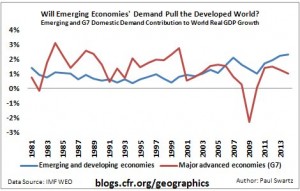It looks like the New World Economic Order has gone mainstream.
That seems to be the case when Merrill Lynch Wealth Management offers its opinion about the re-alignment of the global economy, the idea of buy-and-

hold investing, the role of commodities in a portfolio, risk management and the declining role of the U.S. consumer in shaping the direction of the world economies in a new video interview.
These are heavy topics. The fact that Merrill Lynch is addressing them publicly indicates that lower returns, more risk and higher volatility will become part of the investing scene for years to come.
The good news is that this video provides a good overview of the new investment challenges and the importance of including more asset classes in a portfolio.
The bad news is that there is nothing specific here. The video provides information for you to add general new types of exposures, but you will have to select the ETFs for your portfolio as you prepare for more market volatility and lower wage growth.
You can easily do that on your own by choosing commodity-based ETFs which have definite supply-and-demand characteristics, and by investing in Canada, Australia, Malaysia and Indonesia; all countries with large natural resources, solid balance sheets and political stability.
Take the Information, But Not Merrill’s Products
While this video was prepared by Merrill Lynch Wealth Management, now owned by Bank of America, I would not invest with these firms. They have both received taxpayer bailouts and were mismanaged enough by former Merrill CEO’s John Thain (who spent $1 million to redecorate his office even as Merrill was failing) and Stanley ONeal to contribute significantly to the 2008 market turmoil and beyond. B of A’s anti-customer fees also do not deserve customer support.
But despite this, the video’s worldview and information are valid. The fact that they prepared this interview and white paper (all downloadable from the site for free) show that even the largest wealth management firms acknowledge that they do not have new answers to the current re-alignment of the global economy, even though they contributed significantly to the 2008 market downfall.
Interestingly, the two people in the video interview never mention the word “retirement” as they walk about wealth management. Maybe they feel there is no connection between the two or that the topic was outside the scope of their presentation. But the omission deserves attention because wealth management is all about reaching key financial milestones, culminating in retirement. So much for wealth management when the real topic of the presentation was wealth preservation in an era of wealth destruction
.










